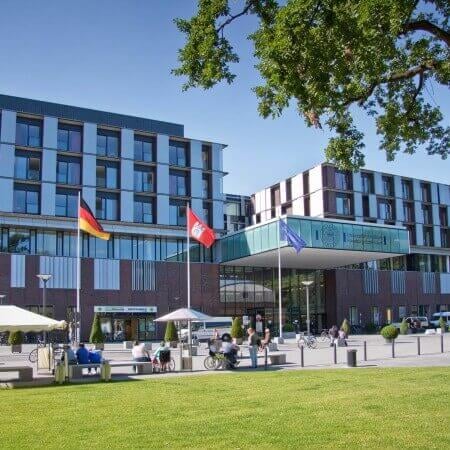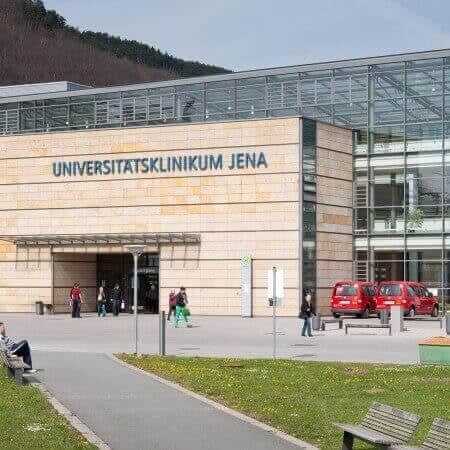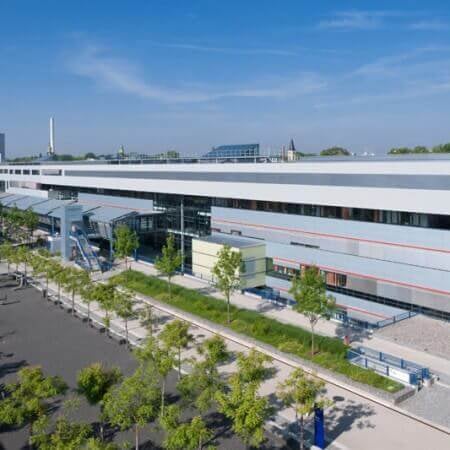Kidney cancer is a malignant tumor developing in one or both kidneys. This disease is in 10th place in terms of prevalence, while it often occurs in urban residents aged 50-70 years.
Content
- Kidney cancer: types
- Risk factors
- Treatment options
- How is the surgery performed?
- Immunotherapy
- Stage 1
- Stage 2
- Stage 3
- Stage 4
- Why consider treating kidney cancer in foreign hospitals?
- Cost of treatment abroad
- How to begin your treatment abroad?
Kidney cancer: types
Kidney cancer occurs in various forms.
Renal cell cancer is the most commonly diagnosed kidney cancer in adults. Renal cell cancer grows from tubules, which form the renal filtration system. Currently, about 90-95 percent among all kidney tumors is renal cell cancer.
The management of renal cell cancers mainly includes surgical intervention. Nonetheless, a peculiarity of sarcomas is their recurrent nature, that is, the ability to reappear in the place of removal. Therefore, an additional treatment for renal cell cancer might be required.
Wilms tumor is pediatric cancer and is treated a different way than in adults. It can be treated with radiotherapy or chemotherapy in combination with surgery.
Risk factors
The presence of risk factors does not mean that a kidney tumor will necessarily appear, but it increases the likelihood. It is worth saying that the absence of any factors also does not mean that you are protected from the development of kidney cancer because its occurrence is associated with more complex mechanisms and possible changes in genes.
There are various risk factors for kidney cancer, including:
- Smoking
- Obesity
- Arterial hypertension
- Certain genetic diseases
- Uncontrolled intake of painkillers for a long time
Treatment options
There are several main methods for the treatment of kidney cancer, which are used in combination or separately.
As a rule, it’s a radical treatment that allows achieving recovery.
The main kinds of surgery are:
- Radical nephrectomy (complete removal of the tumor along with the kidney and the surrounding affected tissues)
- Partial resection
- Cytoreductive surgery (the maximum volume of tumor mass is excised)
If possible, organ-preserving operations are performed, for example, using laparoscopic technologies, with the advantages of minimal tissue trauma, faster recovery, and absence of scars. However, such operations require certain medical indications (small tumor size and absence of metastases). In other cases, open operations are performed.
There’s also an option of radiofrequency ablation through a special electrode-needle or cryoablation. It allows eradicating cancer cells. Ablation is performed percutaneously, but if necessary, it can be performed both open and laparoscopically (through incisions or punctures). The needle direction is monitored using ultrasound or computed tomography. It’s indicated in cases when it’s impossible to conduct a conventional operation.
Embolization of the kidney cancer is performed when there’s bleeding or with no possibility for surgery. During the procedure, a special substance is injected into arteries feeding the tumor. The substance clogs them and, thus, cuts off supply necessary for tumor development.
Drug treatment (chemotherapy, targeted anti-angiogenic therapy) is applied as well. It is carried out in order to reduce the size of the tumor, to destroy the remaining cancer cells. Special drugs are used that affect the growth and multiplication of tumor cells. Aimed at reducing the volume of the primary tumor and number of metastases, it is carried out only in combination with surgical intervention.
How is the surgery performed?
During the operation, the surgeon removes only the tumor within healthy tissue borders in order to preserve kidney function. Sometimes this operation is vital, for example, in the absence of another kidney or if another kidney is not functioning (for example, with polycystic kidney disease or developmental defects).
Renal resection is the main treatment for stage 1 kidney cancer, but in some cases it can be used for stage 2 cancer. The results of this operation depend a lot on the experience of the doctor. A kidney resection is performed in various ways, i.e. as the open surgery through the abdominal cavity, with access through the abdominal wall, through the lumbar approach, and endoscopically.
In hospitals with sufficient experience and the availability of special equipment, it is possible to perform laparoscopic or robot-assisted cancer of kidney resection. Both of these options for endoscopic surgical treatment have several advantages for patients. These are small skin incisions, mild postoperative pain syndrome, and a short hospital stay with the possibility of fast recovery and return to normal activities and work.
Immunotherapy
Immunotherapy is the use of drugs that act not on the tumor, but on the immune system and help the body fight cancer itself.
The role of the immune system is to protect the body from harmful external factors such as bacteria and viruses, but there are also internal factors such as malignant tumors. When tumor cells appear in the body, the immune system tries to identify them and start fighting by activating the immune response. The immune response involves different types of cells, including a special type of white blood cell called T-cells. These cells are programmed to search for and destroy abnormal tumor cells.
Immunotherapy today includes administration of monoclonal antibodies that block specific targets on the cells of the human immune system or on the surface of tumor cells.
Stage 1
Kidney cancer of the first stage is characterized by the fact that tumor cells differ from healthy ones only slightly. This kidney cancer develops rather slowly, which makes it possible to start the treatment timely and achieve the long-term remission or even cure.
Stage 1 kidney cancer responds to treatment fairly well, but only if it is started in a timely manner. It should be borne in mind that after only a few months, the clinical situation can deteriorate significantly.
Kidney cancer does not have any specific symptoms by which it is possible to establish that the patient has cancer. Often, patients attribute malaise to another disease, not paying due attention to it and not resorting to treatment. All this can significantly complicate the subsequent treatment of the disease.
Stage 2
In 50% of cases kidney cancer is detected by chance during ultrasound scan (with a planned clinical examination or treatment for another disease). The early stages of kidney cancer are often asymptomatic. Clinical symptoms of kidney cancer, such as presence of blood in the urine (hematuria), an increase in blood pressure, pain and palpable formation in the projection of the kidney, general symptoms of cancer (weakness, weight loss), are rarely observed at stage 2, or their severity is insignificant. It is necessary to see a doctor for the following symptoms:
- Discoloration of urine, the appearance of blood clots in it
- Aching or bursting pain in the lumbar region
- Frequent urination or discomfort during urination
- Increased body temperature
- Changes in blood pressure for no apparent reason
The main treatment for stage 2 kidney cancer is surgery. Removal of the entire kidney with a tumor (radical nephrectomy) remains the only surgical option for this category of patients. In some cases (with tumors less than 4 cm in size), organ-preserving surgery can be performed. It includes removal of a part of the kidney with a tumor (kidney resection), which allows the organ to be preserved. Currently, the laparoscopic method of removing a kidney tumor is widely used, which is a minimally invasive method of surgical intervention that makes it possible to avoid open surgery (laparotomy).
Stage 3
Stage 3 kidney cancer may include a tumor of various sizes, spreading to the lymph nodes located close to the kidney, as well as to the blood vessels of the kidney and abdomen.
Third-stage kidney cancer can be established only after conducting an examination that includes ultrasound scan, X-ray examination with the use of contrast agents, computed tomography, and magnetic resonance imaging. It becomes possible to determine the type of kidney cancer based on a biopsy.
Surgery is one of the most effective treatments for stage 3 kidney cancer. It is used even if the patient has regional and distant metastases, since the operation significantly increases the patient's survival.
Currently, scientists assess the expediency of conducting surgery for single, even distant metastases of a kidney tumor. As it was demonstrated by the results of medical research, such operations improve the patient's overall quality of life and prolong it significantly.
Stage 4
It is the most difficult to treat stage 4 kidney cancer. In stage 4 cancer, tumor cells significantly differ from healthy cells. Rapid growth and spread beyond the renal segment are characteristic for the advanced stage kidney cancer. Metastases are found in the lymph nodes, in the intestine, spleen, and anterior abdominal wall.
In addition to the conventional treatment methods, embolization of the kidney cancer of stage 4 may be prescribed.
Embolization is a treatment involving blockage (occlusion) of blood vessels of a malformation. Embolization is used for treatment in cases where surgery is associated with a high risk, which is applicable to stage 4 kidney cancer.
For the embolization of the kidney cancer of stage 4 doctors use special embolizing substances. These are drugs (chemoembolization) or coils that are inserted into blood vessels, which cuts off blood circulation into the particular area. The choice of embolizing agent depends primarily on the need for a temporary or permanent result of treatment.
Embolization of the kidney cancer for stage 4 cancer is much less traumatic than open surgery. Embolization of the kidney cancer of stage 4 doesn’t require surgical incisions or further sutures. Therefore, the patient's hospital stay (up to one day) and the risk of complications development are reduced.
Why consider treating kidney cancer in foreign hospitals?
First of all, we should mention the high diagnostic level in foreign hospitals. Methods of visual diagnostics allow detecting the medical condition in just a few days. To determine renal metastases, PET-CT is carried out that is not available in hospitals of developing countries.
Second comes the preference for low-traumatic procedures in foreign hospitals. To remove as much of the tumor as possible and preserve kidney functioning, surgeons must be highly qualified, and hospitals must have the appropriate equipment, which is available at the best foreign hospitals.
And third, treatment of kidney cancer in foreign hospitals demonstrates favourable results even with advanced cancer. The approved treatment regimens for kidney cancer stop the pathological growth, improve the patient's condition and prolong life.
To find out which hospitals offer specific kidney cancer care services, visit the Booking Health website.
Cost of treatment abroad
In each case, price is specified according to the indications, a required number of procedures, and additional hospital services. It is not always possible to estimate a precise cost of treatment abroad, as the price is influenced by too many factors. To clarify prices, or in case of any questions about kidney cancer and its treatment, you can fill out the request form and get a consultation from Booking Health.
The cost of da Vinci partial or complete nephrectomy for kidney cancer (renal cell cancer) is between 16,100 EUR and 23,200 EUR. The cost of embolization or chemoembolization for kidney cancer (renal cell cancer) is between 24,500 EUR and 41,200 EUR.
How to begin your treatment abroad?
Treatment abroad means experienced specialists, high-precision equipment, advanced techniques, and a high level of comfort. If you want to go to Germany, Turkey, Israel, or any other country for treatment abroad, Booking Health will organize the whole treatment abroad for you.
Booking Health negotiates with clinics, prepares and translates documents, issues a medical visa, provides accommodation and transfer, selects the best hospital for treatment for you, and provides many other services.
Booking Health company employs qualified specialists who will help you get answers to all your questions, as well as provide all possible assistance in the selection of specific cancer hospitals or doctors.
Leave a request on the Booking Health website, and our consultants will be happy to answer all your questions.
Authors:
The article was edited by medical experts, board-certified doctors Dr. Vadim Zhiliuk and Dr. Sergey Pashchenko. For the treatment of the conditions referred to in the article, you must consult a doctor; the information in the article is not intended for self-medication!
Our editorial policy, which details our commitment to accuracy and transparency, is available here. Click this link to review our policies.
Sources:
Cancer Support Community
National Kidney Foundation
Urology Care Foundation



















